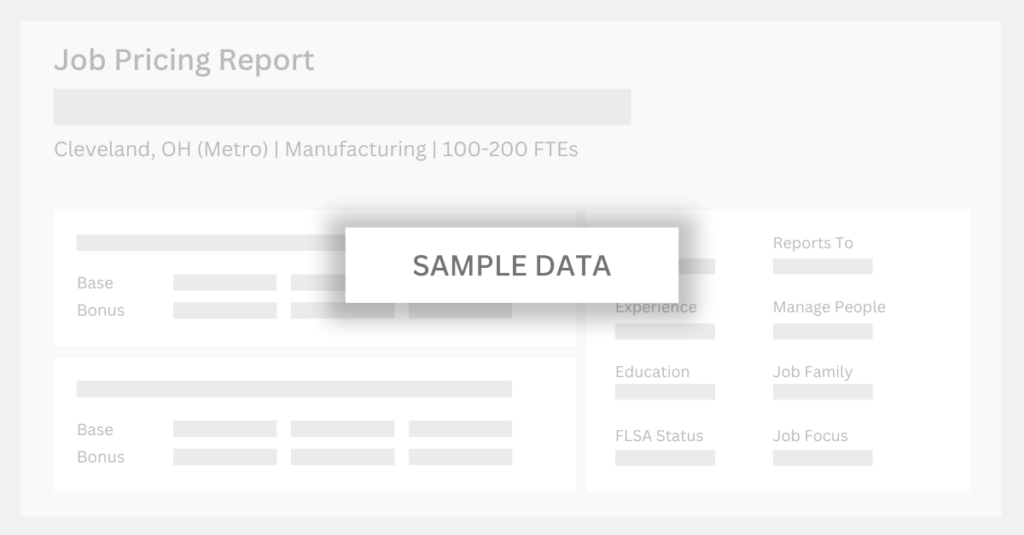Compensation Data for a Chemical Engineer in Ohio

Compensation data breakouts:
- Location (example: Cleveland, Akron, Ohio, National)
- Company Size (number of full-time employees)
- Industry (industry-specific or all industries)
- Years of Experience
- Education
Data included in each report:
- Base Compensation (Salary or Wage)
- Total Compensation
- Bonus
- Long-term Incentives
- Job Description
- Competencies/Skills
Get a Free Sample Report
Submit the form below to receive a sample job pricing report or to access ERC’s compensation data.

ERC is a leading provider of compensation data
Whether you’re actively recruiting and hiring or trying to stay competitive, having local salary and wage data is critical. ERC members gain access to compensation reports, job description research, and an HR Help Desk for compensation and workplace practices data.
Job Description
Overview
- Develops processes and designs equipment for manufacturing chemicals and related products utilizing principles and technology of chemistry, physics, mathematics, engineering, and related physical and natural sciences.
- Solves problems involving the production or use of chemicals, applying principles of chemistry and engineering.
- Plans and tests methods of manufacturing products and treating the by-products.
- Utilizes computer technology to optimize all phases of research and production.
- Excludes paraprofessionals and supervisory positions.
Typical Functions
- Designs, plans layout, and oversees workers engaged in constructing, controlling, and improving equipment to carry out chemical processes on a commercial scale.
- Analyzes operating procedures and equipment and machinery functions to reduce processing time and cost.
- Designs equipment to control movement, storage, and packaging of solids, liquids, and gases.
- Designs and plans measurement and control systems for chemical plants based on data collected in laboratory experiments and pilot plant operations.
- Determines most effective arrangement of unit operations such as mixing, grinding, crushing, heat transfer, size reduction, hydrogenation, distillation, purification, oxidation, polymerization, evaporation, and fermentation, exercising judgment to compromise between process requirements, economic evaluation, operator effectiveness, and physical and health hazards.
- Oversees activities of workers who operate and control such equipment as condensers, absorption and evaporation towers, kilns, pumps, stills, valves, tanks, boilers, compressors, grinders, pipelines, electro-magnets, and centrifuges to effect required chemical or physical change.
- Performs tests and takes measurements throughout stages of production to determine degree of control over variables, such as temperature, density, specific gravity, and pressure.
- May conduct research to develop new and improved chemical manufacturing processes.
- May apply principles of chemical engineering to solve environmental problems.
- May apply principles of chemical engineering to solve bio-medical problems.
- May develop electro-chemical processes to generate electric currents, using controlled chemical reactions, or to produce chemical changes using electric currents.
Similar Positions
There are several positions that share similar responsibilities to a Chemical Engineer, including:
- Process Engineer
- Research and Development Engineer
- Quality Engineer
- Environmental Engineer
- Process Safety Engineer
- Production Engineer
- Plant Engineer
- Operations Engineer
- Petrochemical Engineer
- Bioprocess Engineer
Experience and Education
A Chemical Engineer typically needs a combination of education and experience in the field of chemical engineering. They should have a bachelor’s degree in chemical engineering or a related discipline. Practical experience gained through internships, co-op programs, or entry-level positions is highly valuable. Proficiency in mathematical modeling, data analysis, and process simulation software is important.
Chemical Engineers should have knowledge of chemical processes, thermodynamics, reaction kinetics, and process design principles. Experience with laboratory work, process optimization, and troubleshooting is beneficial. Strong analytical, problem-solving, and communication skills are essential for effective collaboration with interdisciplinary teams and for handling complex engineering challenges.
Competencies and Skills
- Chemical process design
- Reaction engineering
- Thermodynamics
- Process simulation
- Mass and energy balances
- Safety and risk assessment
- Troubleshooting and problem-solving
- Data analysis and statistical methods
FAQ
Chemical engineers work in a variety of industries and settings. They are employed in sectors such as manufacturing, oil and gas, pharmaceuticals, biotechnology, energy, environmental engineering, food and beverage, and materials science. Chemical engineers can be found in research and development laboratories, production plants, engineering consulting firms, government agencies, and academic institutions. They may work on designing and optimizing chemical processes, developing new products, improving manufacturing efficiency, ensuring safety and compliance, conducting research, or providing technical expertise and support. The wide-ranging applications of chemical engineering make it a versatile discipline with opportunities in diverse fields.
Chemical engineers use a wide range of equipment and tools depending on their specific field and the nature of their work. Common equipment includes reactors, distillation columns, heat exchangers, pumps, compressors, valves, and instrumentation for process monitoring and control. They also utilize laboratory equipment such as spectrometers, chromatographs, and various analytical instruments for chemical analysis and experimentation. Additionally, chemical engineers may work with computer-aided design (CAD) software, process simulation tools, and data analysis software to aid in process design, optimization, and analysis. The equipment used by chemical engineers is diverse and varies depending on the industry, research, or operational requirements they are dealing with.
Through frequent polls and surveys, ERC offers a comprehensive collection of recent, reliable data covering workplace practices, employee compensation, benefits, wages, and salaries from local, regional, and national samples.
While “free” compensation data can be found on the web, here’s why you should be cautious:
- Validity — Often “free” salary data is collected from anyone willing to participate or share information. This means you don’t have a good sense of how big the sample size is, the geography of the data, or the type or size of organizations from which the data is being collected.
- Recency — ERC’s survey data relies on regular and consistent participation to ensure that the data is recent, while “free” pay data sources may provide data that is many years old.

